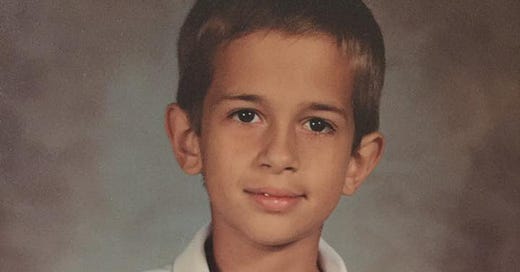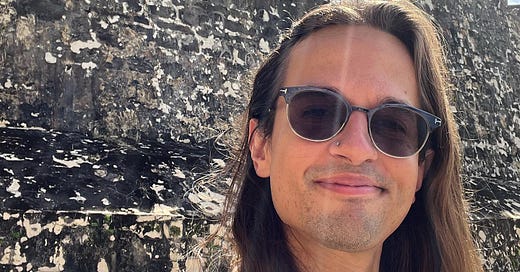
on friendship: the science of chosen family
measuring loyalty, love, and boundaries in our self-selected tribes
tl;dr: true friendship is both an art and science, demanding fierce loyalty while maintaining healthy boundaries. it's not just about splitting bills but about showing up when the world splits apart.
hey mi gente! 👋🏽
i've been thinking a lot about friendship lately.
i don’t mean the superficial "let's grab coffee sometime" kind that populates our dm’s or text chats. i mean the messy, complicated, beautiful disaster that is genuine human connection. the kind where you text each other memes at 3 a.m. and they actually respond. the kind where they've seen you ugly cry and still choose to hang out with you afterwards.
i’ve been going through a really difficult time lately and i’ve leaned on my hyper independence way too much. i’ve realized that maybe, just, maybe - i need to start learning to ask for help and to voice my struggle. i don’t want to suffer in silence. i’m really good at it. and the medal you want for “survived this alone” will never, ever come.
but this has started to make me think… the difference between a friend, an acquaintance, and someone who just happens to know your coffee order. there's a science to this sorting, a delicate alchemy that determines who gets access to the unfiltered version of yourself and who gets the carefully curated highlight reel.
the loyalty experiment
i'll start with what might seem like a trivial question but actually reveals volumes: should friends split the bill?
this seemingly simple question quickly opens a pandora's box of cultural norms, personal values, and relationship dynamics. in puerto rico (or at least, my personal custom), the person who invites typically pays unless there’s a different arrangement due to circumstances. in some american circles, the expectation is to split everything down to the penny. i’ve heard that in germany, they'll calculate exactly what each person consumed with mathematical precision that would impress einstein.
but the bill is just the appetizer for the main course: what do you do when your friend "breaks up" with another friend that's mutual? do you side with your friend or do you become switzerland – neutral, full of chocolate, and morally superior?
me? i'll side with my friends, always.
that doesn't mean i'll join a pitchfork-wielding mob against the ex-friend. it just means that the people i'm in community with – their feelings, their safety – will always take precedence over people i'm not emotionally invested in.
"edgard, that's pretty fucking childish. don't construct your life around the emotional whims of your friends."
you're absolutely right! i agree with you. it is childish. but you know what? I AM CHILDISH! 🧸 i embrace both the light and the dark, i embrace my biases and work hard to curb those that cause harm.
the friendship selection protocol
because i'm very careful (now) about the type of people i call "friends," i trust their decision to discard or disengage from specific people was a philosophical process, an intentional mindful process. i know i don't do it lightly. i agonize and i cry and i get mad at myself, because i always know what i need to do is right.
my role as the "consigliere," the trusted advisor (because my friends are MAIN CHARACTERS, OKAY?), is to be the personification of loyalty, an unwavering ally, and sometimes that means there's a risk of not being fair. but according to my value system, that is a risk i'm willing to take.
friendship isn't a democracy. it's more like a benevolent dictatorship where the dictator is your collective well-being. sometimes, tough decisions need to be made. sometimes, people need to go. the real question is: how do we make those decisions?
the friendship equation
the better questions, the right questions to ask, are these:
what type of people am i in community with?
what demands do they make on my moral framework? on my ethics?
is there a disconnect between my ethics and the ethics my friends demand?
these questions aren't just philosophical musings – they're practical tools for navigating the complex terrain of human relationships. they help us understand not just who our friends are, but who we become in their presence.
a theory of friendship relativity
friendship isn't static; it's a living, breathing entity that evolves over time. the person who was your ride-or-die in college might become a distant memory by your thirties. the coworker you barely noticed might become your emotional support human during a crisis.
in my twenties, i collected friends like pokemon cards. quantity over quality. i was terrified of being alone, of not being liked, of missing out. now, in my late thirties, i understand that friendship is less about accumulation and more about curation.
some friendships are seasonal and that's okay. some are situational, and that's okay too. and some – the rare and precious ones – are forever, transcending time, distance, and circumstance.
these are the friends who show up when you're at your lowest. who send you memes about your specific neuroses because they know it'll make you laugh. who remind you to take your meds and drink water and go outside like a normal human being instead of becoming one with your couch.
the friendship scientific method
here's what i've learned about friendship through trial, error, and a whole lot of therapy:
true friends pass the 3 a.m. test. if you'd call them at 3 a.m. in an emergency (and they'd actually pick up), they're a real friend.
friendship requires maintenance. like any relationship, friendship needs regular care and feeding. check in. show up. remember the little things.
boundaries make better friends. counterintuitively, having clear boundaries often strengthens friendships rather than weakening them.
friendship evolves. the way you were friends in your twenties might not be how you're friends in your forties, and that's okay.
some friendships are meant to end. not every friendship is meant to last forever and that doesn't diminish its value.
friends don't keep score. if you're tallying who paid for what or who called whom last, you're doing it wrong.
loyalty isn't blind. true loyalty means wanting what's best for your friend, even when they can't see it themselves.
the friendship results
and finally – the friend that comes to you in your hour of need and gives you money, love, time, or blasts your mutual aid requests/housing search posts are the ones you should keep. those are the ones you owe your loyalty to.
not everyone is in your corner. but to reference the motto of the great state of michigan – if you really need to know who's in your corner, at your hour of need, look around you.
the true test of friendship isn't how much fun you have together when things are good. it's who shows up when things fall apart.
friends don't split bills unless y'all broke and watching out for each other. otherwise, pick up the tab and take care of it like a corrupt saudi prince. but that's just me. (though if you're always the one paying, maybe examine that dynamic a bit more closely, mi amor.)
to my friends, thank you for loving me. thank you. thank you. i am your liege person of life and limb, and of earthly worship; and faith and truth i will bear unto you, to live and die, against all manner of folx.
what are your friendship non-negotiables? who's shown up for you when you needed it most? drop a comment below – i'd love to hear about your friendship experiments.
hasta la próxima, mis amores! 💖
edgard✊🏽🌈
p.s. if you're reading this and thinking "damn, i don't have friends like that," remember that it's never too late to find your people. sometimes they're hiding in the most unexpected places – like a substack comment section. 😉















Enjoyed very much 👌 🫡🤩